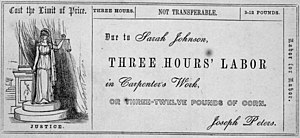신시내티 타임 스토어
Cincinnati Time Store| 다음에 대한 시리즈 일부 |
| 아나키즘 |
|---|
 |
The Cincinnati Time Store (1827-1830) was the first in a series of retail stores created by American individualist anarchist Josiah Warren to test his economic labor theory of value.[1] The experimental store operated from May 18, 1827 until May 1830.[2][3] He sold things at-cost plus a small markup for his time.[4] It is usually considered to be the first time alternative currency labor notes were used,[5] and as such the first experiment in what would later be called mutualism.[6] He also founded stores in New Harmony, Indiana and at Modern Times, Long Island.[7] The store in Cincinnati closed in 1830 with Warren being satisfied he demonstrated running and managing a business without the "erection of any power over the individual".[8] His theory — replacing money with time — was turned into an actual practical demonstration project.[9] It was the first such activity, preceding similar labor notes in Europe by more than 20 years, and still has implications for other concepts of currency such as cryptocurrencies. Nonetheless, at the time it was the most popular mercantile institution in Cincinnati.[10]
History
Warren embraced the labor theory of value, which says that the value of a commodity is the amount of labor that goes into producing or acquiring it. From this he concluded that it was therefore unethical to charge more labor for a product than the labor required to produce it. Warren summed up this policy in the phrase "Cost the limit of price," with "cost" referring the amount of labor one exerted in producing a good. Believing the labor is the foundational cost of things, he held that equal amounts of labor should, naturally, receive equal material compensation. He set out to examine if his theories could be put to practice by establishing his "labor for labor store." If his experiment proved to be successful, his plan was to establish various colonies whose participants all agreed to use "cost the limit of price" in all economic transactions, hoping that all of society would eventually adopt the tenet in all economic affairs.[10]

매장에서는 고객이 노무 수행 약정을 나타내는 '노무노트'로 물품을 구매할 수 있었다.[5] 가게의 품목들은 처음에 고객이 가게 주인과 함께 보낸 시간이 타이머 다이얼로 측정했을 때 가격이 상승함에 따라 그들을 시장에 내놓는데 필요한 노동력을 감안하여 7% 인상되었다. 나중에는 이 가격 인상이 4%로 줄어들었다. 옥수수는 표준으로 사용되었고, 12파운드의 옥수수는 1시간의 노동과 교환할 수 있었다. 이 제도의 결과는 어느 누구도 다른 사람의 노동으로부터 이익을 얻을 수 없다는 것이었다. 표면적으로는 모든 개인이 자신의 노동의 "완전 생산물"을 받았다. 수행된 작업의 어려움과 불쾌함에 대한 조정이 이루어졌으므로, 시간만이 고려되는 요소가 아니었다. 워렌은 또한 벽에 개인들이 어떤 종류의 서비스를 찾고 있거나 팔아야 다른 사람들이 대응할 수 있는 게시판을 붙이고, 노동노트를 이용해 서로 무역을 할 수 있게 했다.[10]
힘든 초기 기간을 거친 후 그 가게는 매우 성공적이었다. 워렌은 다른 상점을 폐업시키려 하지 않는다고 주장했지만 경쟁사 제품보다 훨씬 저렴했다. 이웃에 있는 또 다른 가게가 워렌의 방법으로 개종했다. 고객이 워렌과 더 많은 시간을 보낼수록 상품 가격이 상승했다는 사실은 매우 효율적인 거래를 초래했다. 워렌은 하루에 일반 사업체보다 한 시간 안에 더 많은 사업을 하고 있다고 말했고, 그로 인해 하루 중 일부는 휴업하게 되었다고 말했다. 가게는 성공적이었지만, 서로 다른 업무상 어려움에 대한 노동시간 균등 문제는 워렌에게 걱정거리였다. 그는 모든 노동력을 본질적으로 살균 가능한 상품으로 취급하는 자신의 "노동력" 처방의 객관성과 한 유형의 노동에 사용되는 시간이 다른 유형의 노동 수행 기간 동안 동일한 양의 노동력을 필요로 하는지를 결정하는 주체성을 결코 조화시킬 수 없었다. 그는 그것을 개인의 판단으로 간단히 믿기로 결심했다. 워렌은 1830년 5월, 인건비 원리에 근거해 식민지를 세우기 위해(이들 중 가장 성공적인 것은 '유토피아'이다)를 출발하기 위해 가게를 닫았는데, 그 가게가 '가격의 한도를 계산하라'는 성공적인 실험이었다고 확신했다.[10]
In fact, the store became Cincinnati's most popular at the time. As Cincinnati librarian Steve Kemple noted:
When the advantages of the store became known and its method understood, it was the most popular mercantile institution in the city. The people called it the “Time Store,” not because it gave credit or sold goods on installments, but on account of the peculiar and original method adopted to fix and regulate the amount of the merchant’s compensation. This was determined on the principle of the equal exchange of labor, measured by the time occupied, and exchanged hour for hour with other kinds of labor.[10]
Josiah Warren credited Robert Owen with the creation of the idea for the labor-for-labor note. It was Warren, however, that actually put it into practice at the Time Store.[11] Indeed, Owen thereafter opened the National Equitable Labour Exchange, which embodied the same concept and practice.[12] The Cincinnati Time Store experiment in use of labor as a medium of exchange antedated similar European efforts by two decades.[13] [A]
Reception
Betty Joy Nash noted that, to varying degrees, the time store "communities strived to eliminate discrimination by class, sex, and race, and fostered education and scientific inquiry".[17]
The documentary film Anarchism in America (1981), by Pacific Street Films and funded by the National Endowment for the Humanities, argued that Anarchism had its roots in 19th America with people like Josiah Warren and the Time Store.[13]
Although it goes back to 1827 through 1830, Josiah Warner's "Cincinnati Time Store", which sold merchandise in units of hours of work called "labour notes" which resembled paper money, this was "[p]erhaps ... the anticipator of all future" Local exchange trading systems, and was even a precursor to modern cryptocurrency.[3][18]
Economist Robert J. Shiller used the perceived failure of the Cincinnati Time Store as an analogy to suggest that cryptocurrencies (e.g., Bitcoin) are a "speculative bubble" waiting to burst.[19][20]
관련 출판물
참고 항목
참조
메모들
인용구
- ^ Tyler, A.F. (1953). "Men Against the State: The Expositors of Individualist Anarchism in America, 1827-1908 by James J. Martin and Harry Elmer Barnes". Indiana Magazine of History: 2.
- ^ Welsh, John F. (2010). Max Stirner's Dialectical Egoism: A New Interpretation. Rowman & Littlefield. p. 123. ISBN 9780739141564. Retrieved November 28, 2018.
- ^ a b "Why It's Difficult to Crack Cryptocurrency Mysteries". Khaleej Times. Dubai, United Arab Emirates. May 22, 2018. Archived from the original on November 29, 2018 – via HighBeam Research. (필요한 경우)
- ^ Wunderlich, Roger (1992). Low Living and High Thinking at Modern Times, New York. Syracuse University Press. p. 3. ISBN 9780815625544. Retrieved November 28, 2018.
- ^ a b Wunderlich, Roger (1992). Low Living and High Thinking at Modern Times, New York. Syracuse University Press. pp. 46–47. ISBN 9780815625544. Retrieved November 28, 2018.
- ^ Heywood, Andrew (2017). Political Ideologies: An Introduction. Macmillan International Higher Education. p. 152. ISBN 9781137606044. Retrieved November 28, 2018.
- ^ Shook, John R., ed. (2012). "Warren, Josiah". Dictionary of Early American Philosophers. Bloomsbury Publishing. p. 1089. ISBN 9781441171405. Retrieved November 28, 2018.
- ^ Martin, James J. (1953). Men Against the State. Ludwig von Mises Institute. p. 22. ISBN 9781610163910. Retrieved November 28, 2018.
- ^ Cánovas, Cristóbal Pagán; Teuscher, Ursina (January 2012). "Much more than money: Conceptual integration and the materialization of time in Michael Ende's Momo and the social sciences". Pragmatics & Cognition. John Benjamins Publishing Company. 20 (3): 546–569. doi:10.1075/pc.20.3.05pag. ISSN 0929-0907. E-.
This makes time be money in a very different way: money has been replaced by time. One of the earliest practical applications of this blend was the Cincinnati Time Store.
- ^ a b c d e Kemple, Steve (March 19, 2010). "The Cincinnati Time Store As An Historical Precedent For Societal Change". Cincinnati Ohio: Cincinnati Public Library Presented at CS13. pp. 1–3. Retrieved November 29, 2018.
- ^ Wunderlich, Roger (June 1992). Low Living and High Thinking at Modern Times, New York. Paul Avrich Collection, Library of Congress. pp. 47–48. ISBN 9780815625544.
- ^ Shiller, Robert J. (May 30, 2018). "Cryptocurrencies and the old allure of new money". Financial News. Retrieved November 29, 2018.
Cryptocurrencies create an aura of exclusivity that fills devotees with revolutionary zeal, but we have seen such experiements [sic] fail before
- ^ a b Fishbein, Leslie (1983) [1981]. "Anarchism as Ideology and Impulse: Anarchism in America". Film & History. 13 (1): 17–22. ISSN 0360-3695.
- ^ "Article 31 ROBERT OWEN'S LABOR EXCHANGE CURRENCY". The E-Sylum. 20 (1). January 2, 2017. Retrieved December 14, 2018.
- ^ Pingrey, Darrius H. (February 27, 1902). "The Report of the Industrial Commission: Does it Solve Anything?". The National Corporation Reporter. XXIV: 104.
- ^ Howell, Jerry; Chmielewski, Tom (December 1, 2009). The Complete Idiot's Guide to Barter and Trade Exchanges: Get the Things Your Business Needs Without Spending a Dime (Kindle ed.). p. 46. ISBN 9781101152010.
- ^ Nash, Betty Joy (July 1, 2010). "Utopia, USA". Region Focus. 14 (3): 32. ISSN 1093-1767.
- ^ "Editor's Introduction". The American Journal of Economics and Sociology. November 1, 2006. Archived from the original on November 29, 2018 – via HighBeam Research.
Referencing Moss [1977]2005: 125-128
(필요한 경우) - ^ Bartenstein, Ben; Russo, Camila (May 21, 2018). "Yale's Shiller warns crypto may be another Cincinnati time store". San Francisco Chronicle. Bloomberg News. Retrieved November 28, 2018.
...Two years later, the Welsh textile manufacturer Robert Owen attempted to establish the National Equitable Labour Exchange in London based on 'time money.' Both experiments failed, and a century later, economist John Pease Norton's proposal of an 'electric dollar' devolved into comedic fodder rather than a monetary innovation.
- ^ Shiller, Robert J. (May 22, 2018). "Opinion: Bitcoin isn't the first revolutionary currency". Market Watch. Retrieved November 29, 2018.
Cryptocurrencies are only latest in long line of wanna-be game-changing currencies.
참고 문헌 목록
- 조시아 워런(1846)의 에퀴어블 커머스


